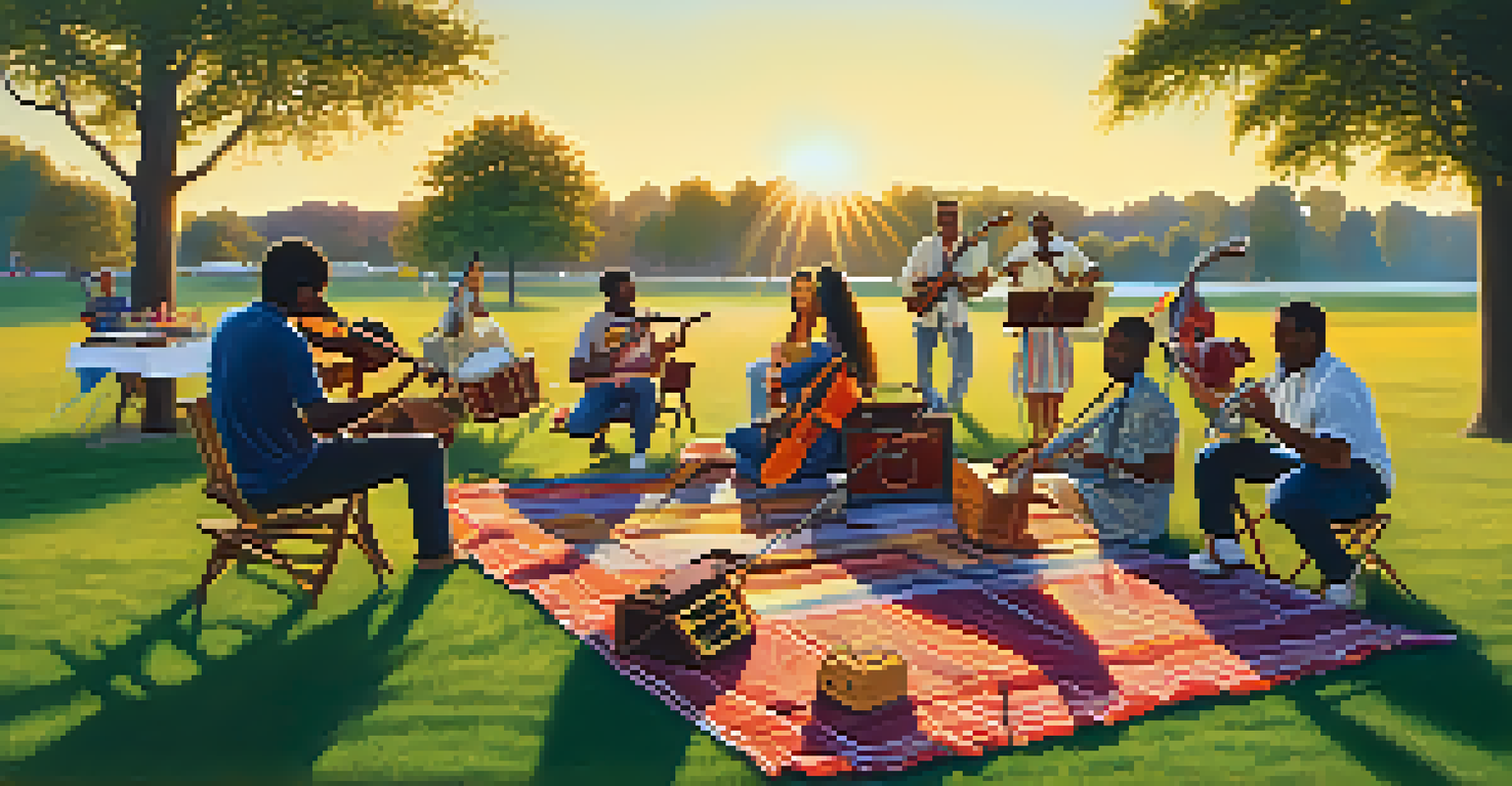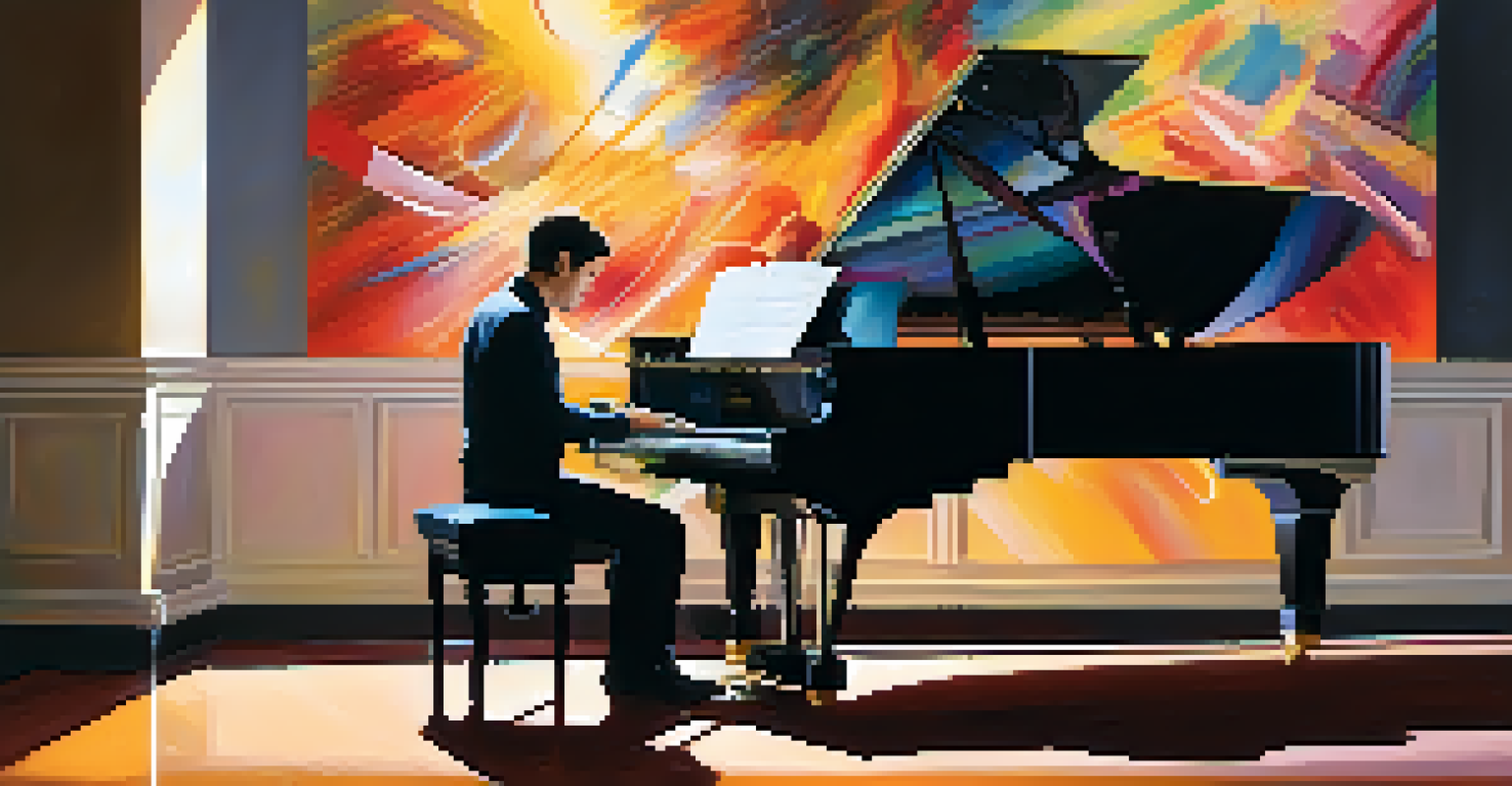The Relationship Between Music and Creativity in Individuals

Understanding the Basics of Music and Creativity
At its core, creativity is the ability to generate new ideas and solutions. Music acts as a powerful catalyst for this process, stimulating our brains in unique ways. When we listen to or create music, we engage multiple areas of the brain, which can enhance our overall creative output.
Music can change the world because it can change people.
For instance, studies have shown that listening to music can improve mood and increase motivation, both of which are essential ingredients for creativity. Think of music as a warm-up exercise for the mind, preparing it to think outside the box.
Furthermore, the emotional connection we have with music can inspire us to explore new concepts and perspectives, making it easier to embrace our creative instincts.
The Science Behind Music's Impact on Creativity
Research indicates that music can stimulate the release of dopamine, a chemical associated with pleasure and reward. This release can create a positive feedback loop that encourages creative thinking. Just imagine how much more inspired you feel after listening to your favorite song!

Additionally, music can alter our brainwave patterns, leading to states of relaxation or heightened focus. These states can be incredibly beneficial when trying to brainstorm new ideas or solve complex problems.
Music Enhances Creative Thinking
Listening to or creating music stimulates various brain areas, improving mood and motivation, which are essential for creativity.
In essence, music serves as a mental boost, helping to clear away distractions and allowing creativity to flourish in a more focused environment.
How Music Genres Affect Creative Thinking
Different genres of music can evoke distinct emotional responses and mental states, which can influence creativity in various ways. For example, classical music often fosters concentration and deep thinking, making it a popular choice for studying or brainstorming.
Creativity is intelligence having fun.
Conversely, upbeat genres like pop or rock can energize and motivate individuals, possibly leading to more spontaneous and free-flowing creative ideas. Think of how a lively tune can make you want to dance or express yourself in new ways.
Understanding the impact of different music genres on our mood and mindset can help individuals choose the right soundtrack for their creative endeavors.
The Role of Music in Creative Problem Solving
When faced with a challenging problem, music can serve as a valuable tool to unlock innovative solutions. Engaging with music can help shift our thinking patterns, allowing us to approach problems from fresh angles.
For example, many artists and inventors have reported that listening to specific types of music helps them find clarity and inspiration during their creative process. It’s almost like having a trusted companion by your side as you navigate through obstacles.
Genres Shape Emotional Responses
Different music genres evoke distinct feelings that can influence how we approach creative tasks and problem-solving.
By integrating music into our problem-solving routines, we can enhance our ability to think critically and creatively, ultimately leading to better outcomes.
Creating Music as a Form of Personal Expression
For many, creating music is one of the most profound ways to express emotions and ideas. Whether it's writing lyrics, composing melodies, or playing instruments, the act of making music can serve as a powerful outlet for creativity.
This expression not only fosters individuality but also allows for deeper self-discovery. Consider how a songwriter might channel their experiences and feelings into a song, creating something uniquely personal.
Engaging in musical creation encourages experimentation and exploration, both hallmarks of the creative process.
Music's Influence on Collaboration and Group Creativity
Music has a unique way of bringing people together, fostering collaboration and collective creativity. Whether in a band, orchestra, or even a casual jam session, shared musical experiences can enhance teamwork and synergy.
When people collaborate on music, they learn to communicate ideas and emotions in ways that might not be possible through words alone. This can lead to richer, more innovative outcomes, as diverse perspectives merge.
Collaboration Through Music
Music fosters teamwork and collective creativity, allowing individuals to communicate emotions and ideas beyond verbal expression.
In this way, music becomes a bridge for collaboration, providing a creative platform that encourages individuals to share their unique talents and ideas.
Incorporating Music into Daily Routines for Enhanced Creativity
Incorporating music into your daily routine can significantly boost your creative potential. Consider playing background music while working on tasks that require focus or creativity to help set the mood.
Additionally, scheduling time for music-related activities, whether it’s listening, playing, or writing, can provide a dedicated space for creative exploration. Just like a painter needs their canvas, a creative mind flourishes with the right musical backdrop.

Ultimately, making music a regular part of your life can help maintain a steady flow of inspiration and creativity, enriching your personal and professional endeavors.